Related Tags
“Back in 2000 to 2005, what we would call a boutique pedal was different”: Pedal maker Brian Wampler on the ‘B-word’
Brian Wampler made the transition from garage workbench to custom manufacturing some time ago, and the artists lining up to declare their allegiance have helped make his effects mainstays of the market.

Effects pedal designers tend to come to their craft via one of two routes: through formal education, technical training, and a slog up the industry ladder; or by pursuing a passionate hobby, poking around where their probe possibly didn’t belong, and learning through the process of repairing and modifying their own gear.
Brian Wampler definitely came into the business via the latter path, but you wouldn’t know it given the heights to which he has ascended, or the often-breathtaking complexity and technicality of much of his company’s current work. But if the man’s progress has gone from a love of dirt pedals, to high-tech digital wonders, to plug-in software emulations of his own effects, he’s still grounded by a passion for a simple and effective overdrive.
Having started playing the guitar at the age of seven, the concept of modifying and then fully redesigning a classic pedal first came to him around the year 2000 when a then more technically savvy pal made some improvements to Wampler’s own Boss DS-1.
“I was amazed at how much the sound quality improved,” Wampler recalls. “So I opened it up to see what he had changed, and this one event triggered a streak of testing pedals, making changes to them, and recording the results. I spent hours in my garage learning as much as I could about electronics and breadboarding, designing new ideas. I was hooked!”
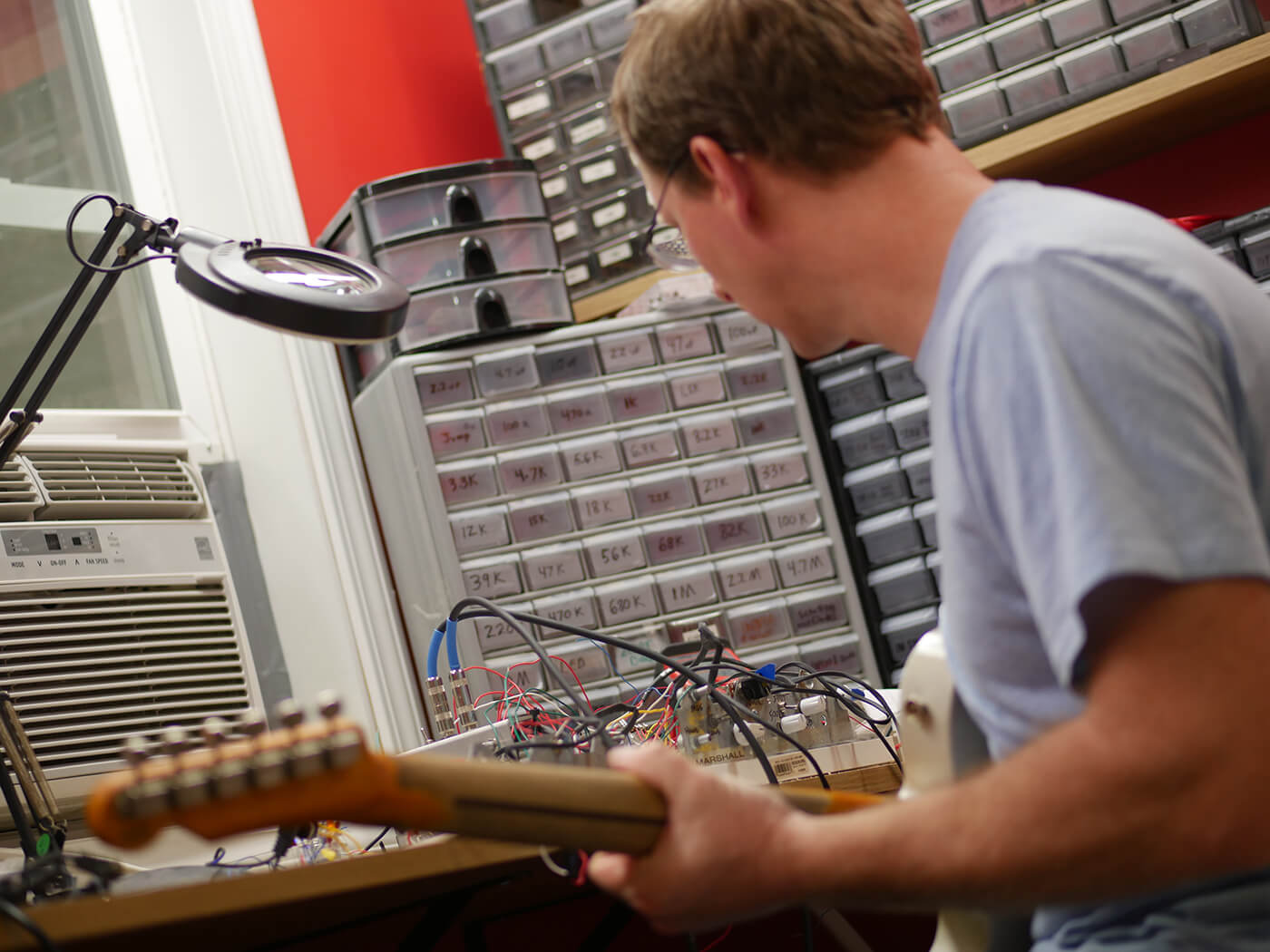
Bypassing boutique
Guitar journalists toss around the B-word as a stand-in for anything made in smaller batches, at a high level of quality, or to an elevated design ethos. As such, though, it can be a misguided catch-all on occasion, and despite ticking two of those three boxes, Brian Wampler doesn’t feel he truly fits the bill anymore.
“Back in 2000 to 2005, what we would call a boutique pedal was different,” says Wampler. “Even back then, companies like Fulltone and Keeley were still kind of considered boutique, but I would say in recent years Fulltone would not really be considered ‘boutique’, or companies like us, or JHS, or EarthQuaker, which are probably some of my closest competitors. Today I think people look at us as ‘high end’ rather than ‘boutique,’ because like some of the other makers that used to be smaller we have become pretty big.
“Now we’re seeing trends, smaller companies like Reeves Electro Guitar Pedals. The guy makes pretty simple circuit designs like Fuzz Faces and boosters and such, but he does it with such an artistic style that it’s amazing. He does part-to-part soldering with no circuit boards and stuff, and when you look inside it’s amazing, it’s like a work of art. To me, that’s kind of the new boutique.
“It’s impossible to scale that up and sell 5,000 pedals a month, but I think there’s still a big market demand for that, and guitarists are not slowing down in their desire to buy a certain something to get a certain tone that they have in mind. But just like every industry, it seems like every year it morphs and changes into something a little bit different.”
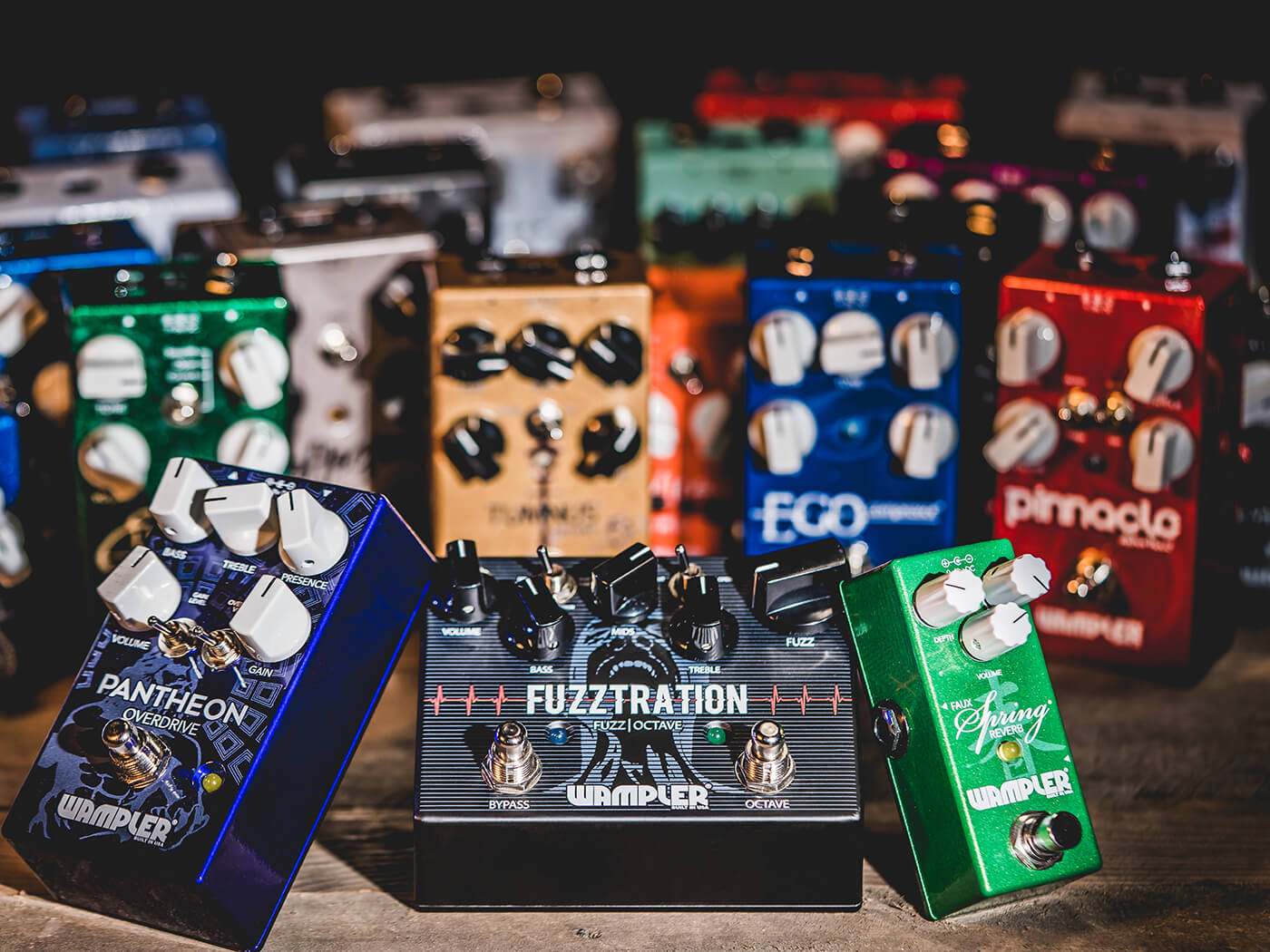
TechCrunch disrupt
Early Wampler successes tended to stick to the classics. Standards like the Pinnacle overdrive, the Paisley Drive, and the Nirvana Chorus took a rather self-explanatory path toward rewarding guitarists’ ongoing search for new and better flavours of effects that were already popular. Gradually, however, Wampler’s designs got more complex, aiming to deliver a more varied and versatile palette of sounds. Many standard-issue pedals were joined by Deluxe versions, which usually added a second footswitchable function and a handful of extra knobs, something already explored with the Brent Mason Hotwired dual overdrive.
As such, pedals like the Fuzztration, the Plexidrive Deluxe, and the Tom Quayle Dual Fusion have upped the feature quotient considerably – but the real exponential explosion came with Wampler’s deeper dive into modern tech.
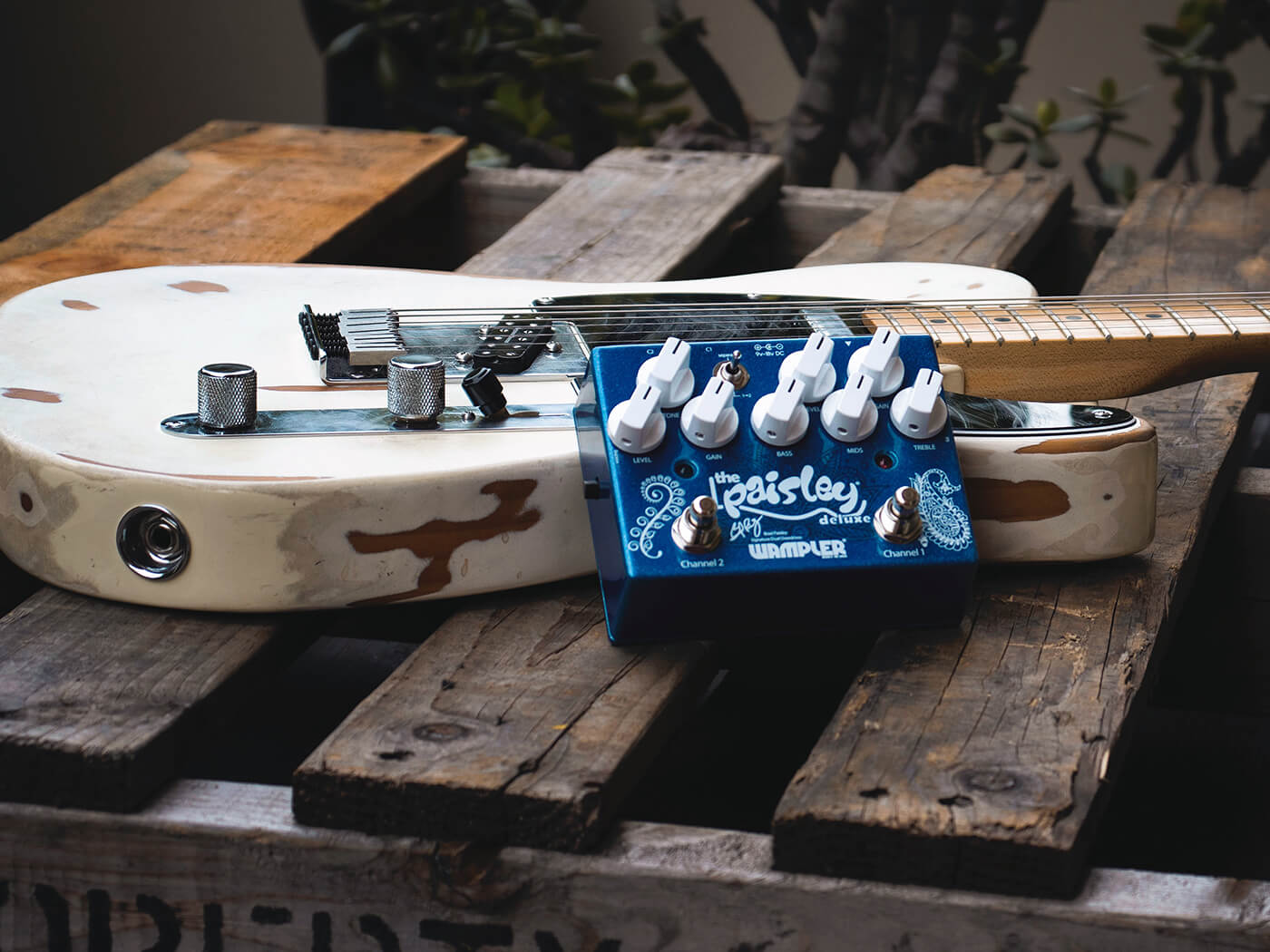
“I really wanted to increase what we were doing from an engineering capacity,” he explains. “While I do still love dirt pedals, and that’s still my favourite thing to make from a personal perspective, I think the way forward for us as a company is to get into some higher-level engineering, while not sacrificing the quality.”
While previous Wampler digital wonders such as the Faux Tape Echo V2, Faux Spring Reverb, and Ethereal Reverb and Delay have hinted in this direction, the envelope was well and truly pushed by the recent Terraform pedal – and the results are breathtaking.
“We really spread our wings with that one,” Wampler agrees. “Think of it as a Strymon Mobius [multidimensional modulation] type of effect: it’s got a selector you can go through 11 different effects, stereo ins and outs, lots of bells and whistles, but I’m still trying to keep it in our style, which is I don’t want menus, I want to make it in such a way that a person can not read a manual and still use it [laughs].
“During the [coronavirus] shutdown we released some plug-ins too, and we’re getting a huge demand for them so we might do more along those lines, as well as pedals. We’ll see, but I definitely am fascinated by the digital side of technology and how that relates to guitars.”
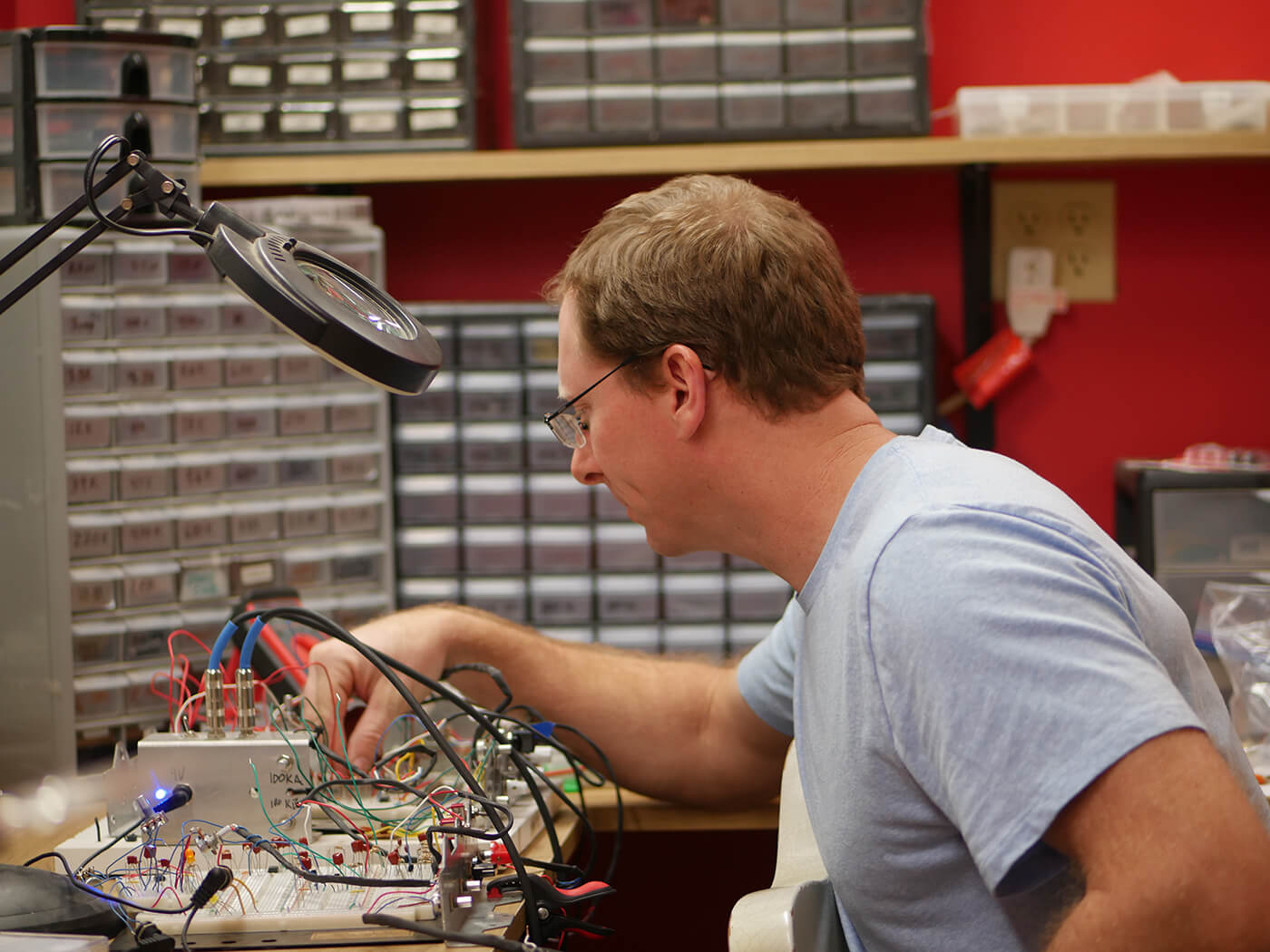
As such, Wampler’s own efforts seem to accurately mirror the progress of digital effects technology from its arrival in the early 1980s to its status today. From, “Wow, look what this thing can do!” to “Eh, digital sounds kind of cold,” to “Wow, look what this thing can do – and it sounds great!”, this tech has come full circle, while finally having put paid to the detracting characteristics that dogged many earlier examples of digital guitar-audio products.
“A lot of the issues with sound quality were because it was very expensive to get really good quality converters for your analogue-to-digital,” Wampler explains. “Not many people wanted to buy a pedal for the price of a small computer. But that’s changed now, and you can get pretty powerful chips that are relatively inexpensive with great quality converters.
“It’s pretty exciting. Even designing effects in a digital environment is a lot different than it was 10 years ago. It used to involved a lot of hand coding – and not that it doesn’t now – but there are people making platforms that allow a WYSIWYG interface, where you can drag and drop stuff, put a circuit board to it and it uploads that effect to your circuit board. So it’s an exciting time to be designing effects, that’s for sure.”
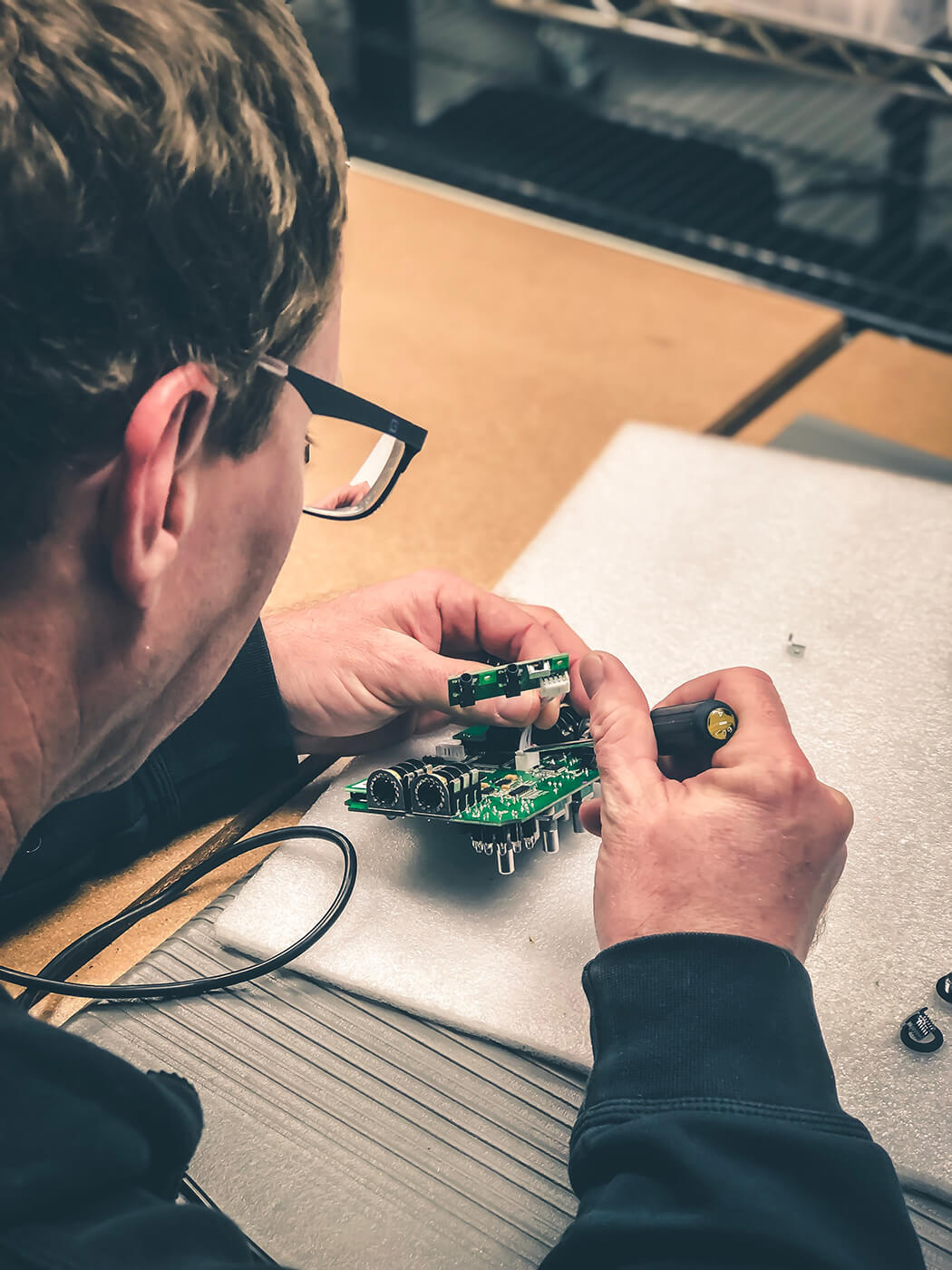
BAD to the bone
Although Wampler built several of his earlier pedals himself, once demand outstripped his ability to keep up the Indiana native jobbed out the manufacturing effort to a company across the river to the south of him in Kentucky, and has more recently shifted to a deal with Boutique Amps Distribution, a California-based company that also provides manufacturing services for Friedman, Tone King, Egnater, Morgan, Bogner Pedals, and several other reputable brands.
Of the venture, Wampler raves, “It’s fantastic! It clarified my life in a lot of ways. Gary Vaynerchuk has written a book called Crush It!, and he did an interview with me for that, and what [this deal] has done for me is in line with things he discusses in that book: it allows me to focus on things that I’m much better at, and enjoy a lot more.
“For me, that’s talking to customers, putting out content, and creating guitar effects. That way, I don’t have to spend my time staring at spreadsheets and calling retailers all across the world to see what they’ve got in stock, and trying to figure out where we’re going to get 9mm screws. All those issues become Boutique Amp’s problem, because those are the parts I didn’t want to mess with. That’s how our arrangement works: they take care of all the things I’m no good at doing, and don’t like doing at all [laughs].”
Essentially, the BAD partnership allows Wampler to work to his strengths, while a turnkey manufacturing option takes care of all practical matters related to getting the pedals built and out the door, providing the kind of division of labour that, for lack thereof, plenty of promising small companies have been done in.
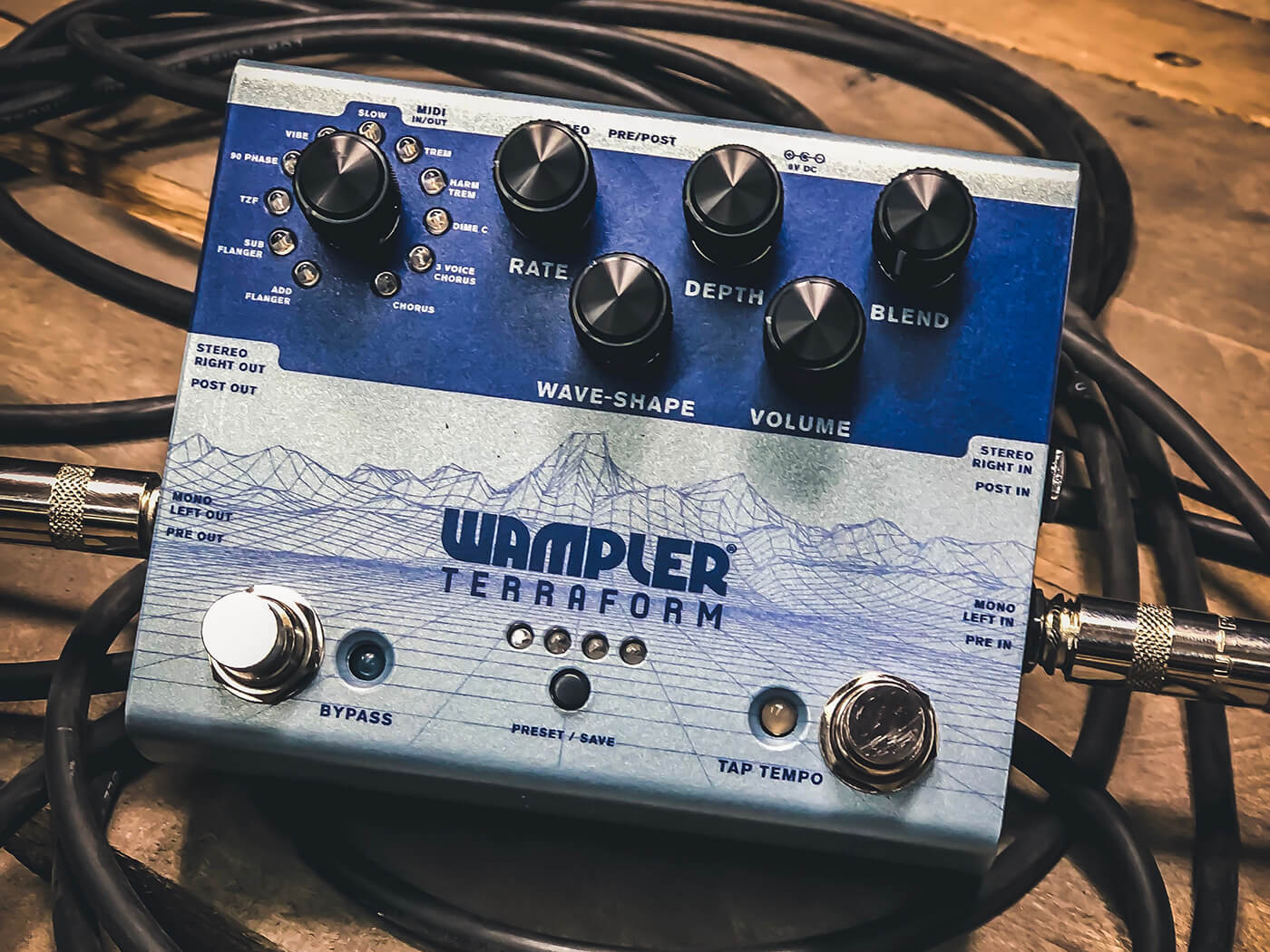
“Just because a person is good at circuitry or soldering does not mean they’ll be successful at creating a business doing the soldering,” Wamper elaborates. “If your skillset is listening to guitar tones and trying to figure out how to make a product that sounds like a better Plexi-style pedal, that’s not necessarily the same person that’s going to be able to talk about profit margins with retailers in Switzerland. It’s a different skillset.”
In addition, the BAD deal has allowed Wampler to shift his working life to an arrangement that much better suits, well, the rest of his life.
“I used to work out of a big office building,” he relates, “and have a bunch of employees that I had to manage every day. Now I have a couple guys that work with me, but we all work from our homes, and my days are half as long as they used to be. I used to work from sunup to sundown, and now there are a lot of days that, if it’s nice out, ‘You know, I’m just going to go take a walk for a while, maybe grab some lunch somewhere.’ I can take it easy and enjoy life more. Especially at times like now when my kids are home, I’m not gone so much.”
No more heroes
In the early years, Wampler’s signature designs for Brent Mason and Brad Paisley played a significant part in getting the company on its feet, and the artist collaboration has remained a rewarding path, even while the concept of the ‘guitar star’ is ever-shifting.
“We’re getting ready to release something with Andy Woods,” says Wampler, “and working with Pete Thorn and stuff. But the music world is different than it used to be. From that perspective, it’s an interesting subject.
“For example, Cory Wong is a player that I respect immensely, a fantastic player and very well known amongst guitar players. And it’s interesting how in the past if you said ‘Slash’, everybody knew who Slash was, whether you listened to country, blues, jazz or whatever. Today, you have segments of the population that absolutely love Cory Wong and everything he puts out, but the people who are listening to Bonamassa might not even know who Cory Wong is. So, it’s interesting what ‘fame’ is, and what an ‘artist’ is in music circuits these days. Often you hear the term ‘influencer’ thrown around more than ‘artist’.”

That being said – and after briefly devolving into a joint moan about the state of the music business in general – Wampler agrees that no gear manufacturer is likely to stay afloat selling only to ‘guitar heroes’ anyway, or even to the limited fan base of any of the remaining guitar stars. The hobby player remains the meat of the market, and that’s exactly as it should be.
“I look at it kind of like golf clubs or tennis rackets or something,” he muses. “You’re always going to have the people that enjoy not only playing the sport, or the craft, but they enjoy being part of the community, looking at new products, buying new products, trading things with their friends. That’s all part of the hobby, it’s not just the sitting down and playing the pentatonic scale.”
That being said, if Wampler were trading for one of his own pedals, what might it be? What’s his own favourite amid the ever-expanding line?
“I always tell people my favourite pedals tend to be the ones we haven’t released yet,” he says, “because I haven’t spent a ridiculous number of hours trying to make a bunch of videos and playing through them and all that. Of the things that we have right now – and again, being a guitar player myself, my opinion’s probably going to change tomorrow – but today I was playing the Pantheon [overdrive] and that was hitting the spot. And the Tumnus is always a very fun thing to play with, if you like that Klon-style, 1k midrange boost.”
Visit wamplerpedals.com for more.
